- Home
- Ernest Hemingway
The Old Man and the Sea Page 4
The Old Man and the Sea Read online
Page 4
Let us hope so, he thought.
A small bird came toward the skiff from the north. He was a warbler and flying very low over the water. The old man could see that he was very tired.
The bird made the stern of the boat and rested there. Then he flew around the old man's head and rested on the line where he was more comfortable.
"How old are you?" the old man asked the bird. "Is this your first trip?"
The bird looked at him when he spoke. He was too tired even to examine the line and he teetered on it as his delicate feet gripped it fast.
"It's steady," the old man told him. "It's too steady. You shouldn't be that tired after a windless night. What are birds coming to?"
The hawks, he thought, that come out to sea to meet them. But he said nothing of this to the bird who could not understand him anyway and who would learn about the hawks soon enough.
"Take a good rest, small bird," he said. "Then go in and take your chance like any man or bird or fish."
It encouraged him to talk because his back had stiffened in the night and it hurt truly now.
"Stay at my house if you like, bird," he said. "I am sorry I cannot hoist the sail and take you in with the small breeze that is rising. But I am with a friend."
Just then the fish gave a sudden lurch that pulled the old man down onto the bow and would have pulled him overboard if he had not braced himself and given some line.
The bird had flown up when the line jerked and the old man had not even seen him go. He felt the line carefully with his right hand and noticed his hand was bleeding.
"Something hurt him then," he said aloud and pulled back on the line to see if he could turn the fish. But when he was touching the breaking point he held steady and settled back against the strain of the line.
"You're feeling it now, fish," he said. "And so, God knows, am I."
He looked around for the bird now because he would have liked him for company. The bird was gone.
You did not stay long, the man thought. But it is rougher where you are going until you make the shore. How did I let the fish cut me with that one quick pull he made? I must be getting very stupid. Or perhaps I was looking at the small bird and thinking of him. Now I will pay attention to my work and then I must eat the tuna so that I will not have a failure of strength.
"I wish the boy were here and that I had some salt," he said aloud.
Shifting the weight of the line to his left shoulder and kneeling carefully he washed his hand in the ocean and held it there, submerged, for more than a minute watching the blood trail away and the steady movement of the water against his hand as the boat moved.
"He has slowed much," he said.
The old man would have liked to keep his hand in the salt water longer but he was afraid of another sudden lurch by the fish and he stood up and braced himself and held his hand up against the sun. It was only a line burn that had cut his flesh. But it was in the working part of his hand. He knew he would need his hands before this was over and he did not like to be cut before it started.
"Now," he said, when his hand had dried, "I must eat the small tuna. I can reach him with the gaff and eat him here in comfort."
He knelt down and found the tuna under the stern with the gaff and drew it toward him keeping it clear of the coiled lines. Holding the line with his left shoulder again, and bracing on his left hand and arm, he took the tuna off the gaff hook and put the gaff back in place. He put one knee on the fish and cut strips of dark red meat longitudinally from the back of the head to the tail. They were wedge-shaped strips and he cut them from next to the backbone down to the edge of the belly. When he had cut six strips he spread them out on the wood of the bow, wiped his knife on his trousers, and lifted the carcass of the bonito by the tail and dropped it overboard.
"I don't think I can eat an entire one," he said and drew his knife across one of the strips. He could feel the steady hard pull of the line and his left hand was cramped. It drew up tight on the heavy cord and he looked at it in disgust.
"What kind of a hand is that," he said. "Cramp then if you want. Make yourself into a claw. It will do you no good."
Come on, he thought and looked down into the dark water at the slant of the line. Eat it now and it will strengthen the hand. It is not the hand's fault and you have been many hours with the fish. But you can stay with him forever. Eat the bonito now.
He picked up a piece and put it in his mouth and chewed it slowly. It was not unpleasant.
Chew it well, he thought, and get all the juices. It would not be bad to eat with a little lime or with lemon or with salt.
"How do you feel, hand?" he asked the cramped hand that was almost as stiff as rigor mortis. "I'll eat some more for you."
He ate the other part of the piece that he had cut in two. He chewed it carefully and then spat out the skin.
"How does it go, hand? Or is it too early to know?"
He took another full piece and chewed it.
"It is a strong full-blooded fish," he thought. "I was lucky to get him instead of dolphin. Dolphin is too sweet. This is hardly sweet at all and all the strength is still in it."
There is no sense in being anything but practical though, he thought. I wish I had some salt. And I do not know whether the sun will rot or dry what is left, so I had better eat it all although I am not hungry. The fish is calm and steady. I will eat it all and then I will be ready.
"Be patient, hand," he said. "I do this for you."
I wish I could feed the fish, he thought. He is my brother. But I must kill him and keep strong to do it. Slowly and conscientiously he ate all of the wedge-shaped strips of fish.
He straightened up, wiping his hand on his trousers.
"Now," he said. "You can let the cord go, hand, and I will handle him with the right arm alone until you stop that nonsense." He put his left foot on the heavy line that the left hand had held and lay back against the pull against his back.
"God help me to have the cramp go," he said. "Because I do not know what the fish is going to do."
But he seems calm, he thought, and following his plan. But what is his plan, he thought. And what is mine? Mine I must improvise to his because of his great size. If he will jump I can kill him. But he stays down forever. Then I will stay down with him forever.
He rubbed the cramped hand against his trousers and tried to gentle the fingers. But it would not open. Maybe it will open with the sun, he thought. Maybe it will open when the strong raw tuna is digested. If I have to have it, I will open it, cost whatever it costs. But I do not want to open it now by force. Let it open by itself and come back of its own accord. After all I abused it much in the night when it was necessary to free and untie the various lines.
He looked across the sea and knew how alone he was now. But he could see the prisms in the deep dark water and the line stretching ahead and the strange undulation of the calm. The clouds were building up now for the trade wind and he looked ahead and saw a flight of wild ducks etching themselves against the sky over the water, then blurring, then etching again and he knew no man was ever alone on the sea.
He thought of how some men feared being out of sight of land in a small boat and knew they were right in the months of sudden bad weather. But now they were in hurricane months and, when there are no hurricanes, the weather of hurricane months is the best of all the year.
If there is a hurricane you always see the signs of it in the sky for days ahead, if you are at sea. They do not see it ashore because they do not know what to look for, he thought. The land must make a difference too, in the shape of the clouds. But we have no hurricane coming now.
He looked at the sky and saw the white cumulus built like friendly piles of ice cream and high above were the thin feathers of the cirrus against the high September sky.
"Light brisa," he said. "Better weather for me than for you, fish."
His left hand was still cramped, but he was unknotting it slowly.
I hate a cramp,
he thought. It is a treachery of one's own body. It is humiliating before others to have a diarrhoea from ptomaine poisoning or to vomit from it. But a cramp, he thought of it as a calambre, humiliates oneself especially when one is alone.
If the boy were here he could rub it for me and loosen it down from the forearm, he thought. But it will loosen up.
Then, with his right hand he felt the difference in the pull of the line before he saw the slant change in the water. Then, as he leaned against the line and slapped his left hand hard and fast against his thigh he saw the line slanting slowly upward.
"He's coming up," he said. "Come on hand. Please come on."
The line rose slowly and steadily and then the surface of the ocean bulged ahead of the boat and the fish came out. He came out unendingly and water poured from his sides. He was bright in the sun and his head and back were dark purple and in the sun the stripes on his sides showed wide and a light lavender. His sword was as long as a baseball bat and tapered like a rapier and he rose his full length from the water and then re-entered it, smoothly, like a diver and the old man saw the great scythe-blade of his tail go under and the line commenced to race out.
"He is two feet longer than the skiff," the old man said. The line was going out fast but steadily and the fish was not panicked. The old man was trying with both hands to keep the line just inside of breaking strength. He knew that if he could not slow the fish with a steady pressure the fish could take out all the line and break it.
He is a great fish and I must convince him, he thought. I must never let him learn his strength nor what he could do if he made his run. If I were him I would put in everything now and go until something broke. But, thank God, they are not as intelligent as we who kill them; although they are more noble and more able.
The old man had seen many great fish. He had seen many that weighed more than a thousand pounds and he had caught two of that size in his life, but never alone. Now alone, and out of sight of land, he was fast to the biggest fish that he had ever seen and bigger than he had ever heard of, and his left hand was still as tight as the gripped claws of an eagle.
It will uncramp though, he thought. Surely it will uncramp to help my right hand. There are three things that are brothers: the fish and my two hands. It must uncramp. It is unworthy of it to be cramped. The fish had slowed again and was going at his usual pace.
I wonder why he jumped, the old man thought. He jumped almost as though to show me how big he was. I know now, anyway, he thought. I wish I could show him what sort of man I am. But then he would see the cramped hand. Let him think I am more man than I am and I will be so. I wish I was the fish, he thought, with everything he has against only my will and my intelligence.
He settled comfortably against the wood and took his suffering as it came and the fish swam steadily and the boat moved slowly through the dark water. There was a small sea rising with the wind coming up from the east and at noon the old man's left hand was uncramped.
"Bad news for you, fish," he said and shifted the line over the sacks that covered his shoulders.
He was comfortable but suffering, although he did not admit the suffering at all.
"I am not religious," he said. "But I will say ten Our Fathers and ten Hail Marys that I should catch this fish, and I promise to make a pilgrimage to the Virgin of Cobre if I catch him. That is a promise."
He commenced to say his prayers mechanically. Sometimes he would be so tired that he could not remember the prayer and then he would say them fast so that they would come automatically. Hail Marys are easier to say than Our Fathers, he thought.
"Hail Mary full of Grace the Lord is with thee. Blessed art thou among women and blessed is the fruit of thy womb, Jesus. Holy Mary, Mother of God, pray for us sinners now and at the hour of our death. Amen." Then he added, "Blessed Virgin, pray for the death of this fish. Wonderful though he is."
With his prayers said, and feeling much better, but suffering exactly as much, and perhaps a little more, he leaned against the wood of the bow and began, mechanically, to work the fingers of his left hand.
The sun was hot now although the breeze was rising gently.
"I had better re-bait that little line out over the stern," he said. "If the fish decides to stay another night l will need to eat again and the water is low in the bottle. I don't think I can get anything but a dolphin here. But if I eat him fresh enough he won't be bad. I wish a flying fish would come on board tonight. But I have no light to attract them. A flying fish is excellent to eat raw and I would not have to cut him up. I must save all my strength now. Christ, I did not know he was so big."
"I'll kill him though," he said. "In all his greatness and his glory."
Although it is unjust, he thought. But I will show him what a man can do and what a man endures.
"I told the boy I was a strange old man," he said. "Now is when I must prove it."
The thousand times that he had proved it meant nothing. Now he was proving it again. Each time was a new time and he never thought about the past when he was doing it.
I wish he'd sleep and I could sleep and dream about the lions, he thought. Why are the lions the main thing that is left? Don't think, old man, he said to himself. Rest gently now against the wood and think of nothing. He is working. Work as little as you can.
It was getting into the afternoon and the boat still moved slowly and steadily. But there was an added drag now from the easterly breeze and the old man rode gently with the small sea and the hurt of the cord across his back came to him easily and smoothly.
Once in the afternoon the line started to rise again. But the fish only continued to swim at a slightly higher level. The sun was on the old man's left arm and shoulder and on his back. So he knew the fish had turned east of north.
Now that he had seen him once, he could picture the fish swimming in the water with his purple pectoral fins set wide as wings and the great erect tail slicing through the dark. I wonder how much he sees at that depth, the old man thought. His eye is huge and a horse, with much less eye, can see in the dark. Once I could see quite well in the dark. Not in the absolute dark. But almost as a cat sees.
The sun and his steady movement of his fingers had uncramped his left hand now completely and he began to shift more of the strain to it and he shrugged the muscles of his back to shift the hurt of the cord a little.
"If you're not tired, fish," he said aloud, "you must be very strange."
He felt very tired now and he knew the night would come soon and he tried to think of other things. He thought of the Big Leagues, to him they were the Gran Ligas, and he knew that the Yankees of New York were playing the Tigres of Detroit.
This is the second day now that I do not know the result of the juegos, he thought. But I must have confidence and I must be worthy of the great DiMaggio who does all things perfectly even with the pain of the bone spur in his heel. What is a bone spur? he asked himself. Un espuela de hueso. We do not have them. Can it be as painful as the spur of a fighting cock in one's heel? I do not think I could endure that or the loss of the eye and of both eyes and continue to fight as the fighting cocks do. Man is not much beside the great birds and beasts. Still I would rather be that beast down there in the darkness of the sea.
"Unless sharks come," he said aloud. "If sharks come, God pity him and me."
Do you believe the great DiMaggio would stay with a fish as long as I will stay with this one? he thought. I am sure he would and more since he is young and strong. Also his father was a fisherman. But would the bone spur hurt him too much?
"I do not know," he said aloud. "I never had a bone spur."
As the sun set he remembered, to give himself more confidence, the time in the tavern at Casablanca when he had played the hand game with the great negro from Cienfuegos who was the strongest man on the docks. They had gone one day and one night with their elbows on a chalk line on the table and their forearms straight up and their hands gripped tight. Each one was trying to force the
other's hand down onto the table. There was much betting and people went in and out of the room under the kerosene lights and he had looked at the arm and hand of the negro and at the negro's face. They changed the referees every four hours after the first eight so that the referees could sleep. Blood came out from under the fingernails of both his and the negro's hands and they looked each other in the eye and at their hands and forearms and the bettors went in and out of the room and sat on high chairs against the wall and watched. The walls were painted bright blue and were of wood and the lamps threw their shadows against them. The negro's shadow was huge and it moved on the wall as the breeze moved the lamps.
The odds would change back and forth all night and they fed the negro rum and lighted cigarettes for him. Then the negro, after the rum, would try for a tremendous effort and once he had the old man, who was not an old man then but was Santiago El Campeon, nearly three inches off balance. But the old man had raised his hand up to dead even again. He was sure then that he had the negro, who was a fine man and a great athlete, beaten. And at daylight when the bettors were asking that it be called a draw and the referee was shaking his head, he had unleashed his effort and forced the hand of the negro down and down until it rested on the wood. The match had started on a Sunday morning and ended on a Monday morning. Many of the bettors had asked for a draw because they had to go to work on the docks loading sacks of sugar or at the Havana Coal Company. Otherwise everyone would have wanted it to go to a finish. But he had finished it anyway and before anyone had to go to work.
For a long time after that everyone had called him The Champion and there had been a return match in the spring. But not much money was bet and he had won it quite easily since he had broken the confidence of the negro from Cienfuegos in the first match. After that he had a few matches and then no more. He decided that he could beat anyone if he wanted to badly enough and he decided that it was bad for his right hand for fishing. He had tried a few practice matches with his left hand. But his left hand had always been a traitor and would not do what he called on it to do and he did not trust it.

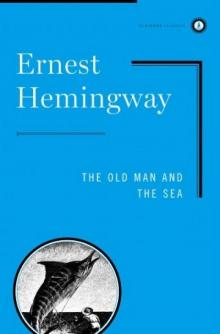 The Old Man and the Sea
The Old Man and the Sea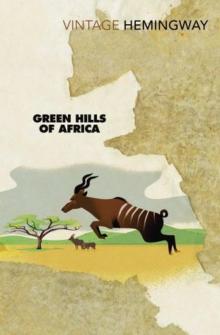 Green Hills of Africa
Green Hills of Africa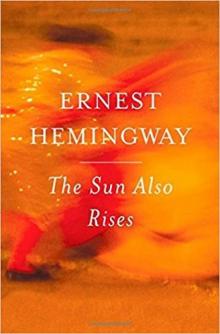 The Sun Also Rises
The Sun Also Rises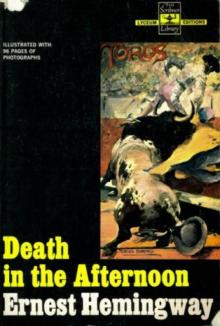 Death in the Afternoon
Death in the Afternoon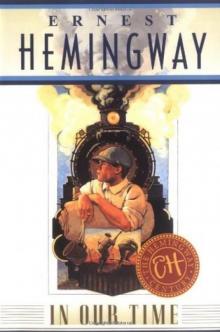 In Our Time
In Our Time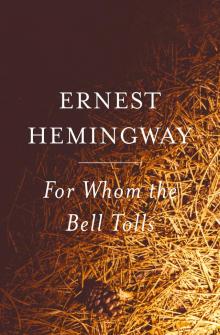 For Whom the Bell Tolls
For Whom the Bell Tolls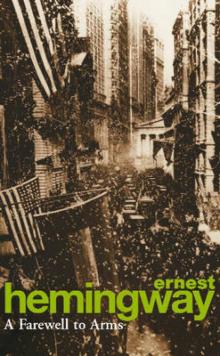 A Farewell to Arms
A Farewell to Arms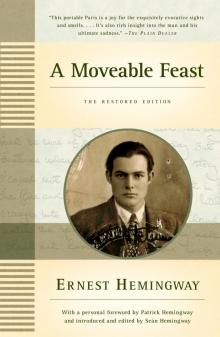 A Moveable Feast
A Moveable Feast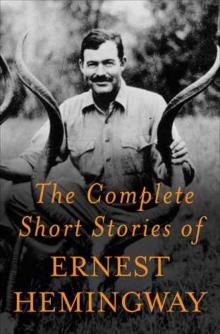 The Complete Short Stories of Ernest Hemingway
The Complete Short Stories of Ernest Hemingway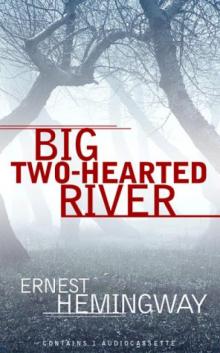 Big Two-Hearted River
Big Two-Hearted River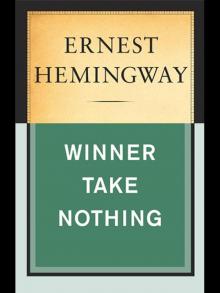 Winner Take Nothing
Winner Take Nothing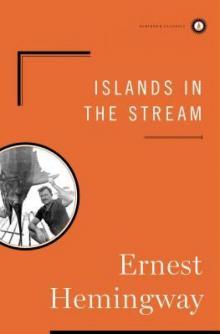 Islands in the Stream
Islands in the Stream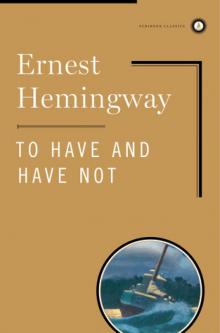 To Have and Have Not
To Have and Have Not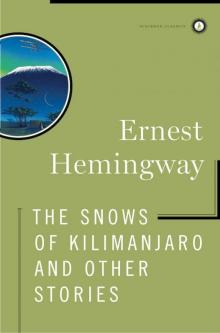 The Snows of Kilimanjaro and Other Stories
The Snows of Kilimanjaro and Other Stories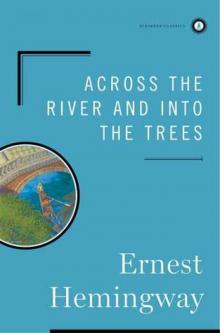 Across the River and Into the Trees
Across the River and Into the Trees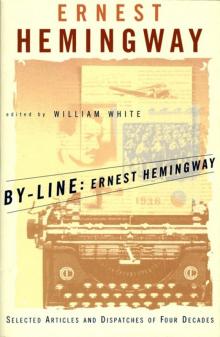 By-Line Ernest Hemingway
By-Line Ernest Hemingway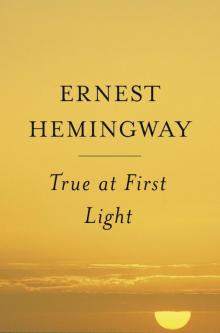 True at First Light
True at First Light Men Without Women
Men Without Women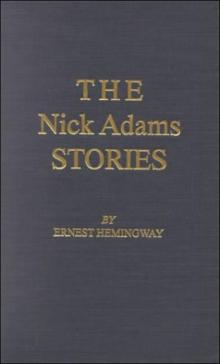 The Nick Adams Stories
The Nick Adams Stories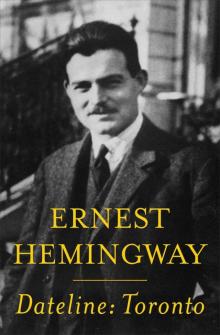 Dateline- Toronto
Dateline- Toronto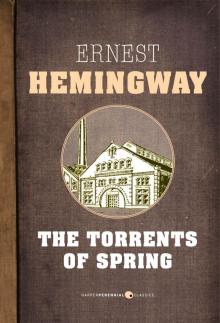 The Torrents of Spring
The Torrents of Spring Short Stories
Short Stories